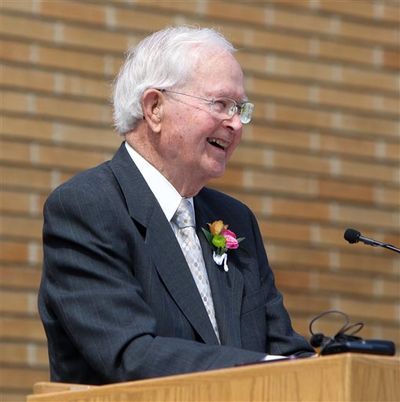Former Gov. Batt urges Idahoans to fund roads

BOISE, Idaho - Former Idaho Gov. Phil Batt urged Idahoans Thursday to step up and fund road improvements, saying failure to raise the gas tax for nearly 20 years is destroying the system generations of Idahoans built.
His message came as the Idaho Transportation Department’s headquarters was renamed for him; lawmakers in attendance said he’s right, and current Gov. Butch Otter said it’s an issue Idaho will be hearing more about.
Batt, who served as a senator, senate leader, transportation board member and lieutenant governor before being elected governor in 1994, pushed through the state’s last gas tax increase in 1996, and it hasn’t been raised since. That’s the main way Idaho funds its roads, and the per-gallon tax not only isn’t indexed for inflation, it’s seen declines as vehicles have become more efficient.
Batt recalled major upgrades Idaho’s roads have seen over the years, including treacherous sections of U.S. Highway 95 in North Idaho and down south, Horseshoe Bend hill, which “used to regularly develop mysterious sinking sections.” Now, he said, they’re safer, more useful highways.
“These projects and others like them throughout the state cost a pile of money, but Idahoans in early days were willing to tax themselves to pay the bill,” Batt told the crowd gathered for the building renaming ceremony. “Now, adopting the model of the federal government, we’d rather do nothing or borrow enough money to get by.”
When the state decided to upgrade the freeway between Boise and Canyon County, it borrowed money from the federal government through GARVEE bonds. But Batt warned that federal funding can’t be relied on, and will be decreasing in the future. “We need to get together and raise the finances to take care of all our state’s transportation needs, not just the Treasure Valley, and not by borrowing money – that honeymoon is over,” Batt declared. “It’s our responsibility and we need to face it.”
Amid laughter, Batt said, “I ran as a skinflint for governor and I served as a tightwad.” Yet, he said, “I knew that this rapidly growing state with its difficult terrain needed a maximum effort for highway financing. What could be more equitable than harging users fees to pay for our roads, gas tax and registration fees?”
He said, “We’re broke – our credit card is maxed out. It’s time to raise these user fees again.”
Numerous speakers lauded Batt, whose accomplishments over his career included major transportation upgrades for the state, the Idaho Human Rights Act, securing long-sought workers’ compensation for agricultural workers, signing a nuclear waste agreement with the federal government requiring waste to be removed from the state, and much more.
Said Sen. Patti Anne Lodge, “Gov. Batt will always be remembered for doing the right thing, even if it’s not popular at the time.” Idaho’s congressional delegation, in a letter read at the ceremony, called Batt “a true innovator in fiscal matters, infrastructure and overall leadership.”
Several lawmakers in attendance said they took Batt’s message about transportation funding to heart. “I think he’s absolutely correct,” said Sen. Chuck Winder, R-Boise. House Speaker Scott Bedke, R-Oakley, said, “This generation cannot duck our responsibility to maintain the investment that previous generations have put into our roads, so when the time’s right, I’m optimistic that we’ll step up.”
Batt said the gas tax set in 1996 – “two bits” a gallon, or 25 cents – was more than 20 percent of the selling price of gasoline at the time. If that were the case today, Idaho’s gas tax would be 76 cents a gallon.
“Butch has tried his best to get some funding,” Batt said. “It’s the legislators that wouldn’t cooperate. There’s some talk that they won’t do it again this year because it’s an election year. I never believed in that philosophy, but I understand it.”
Otter called Batt’s warning “a great message,” adding, “And I think it’s a message that you’re going to hear more about.”